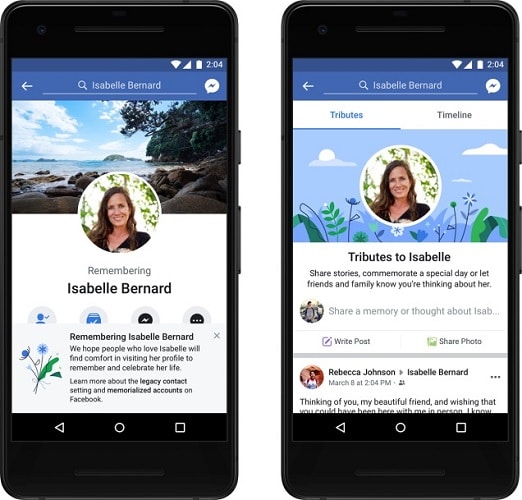
For some years, Facebook has enabled users to appoint a proxy to manage their account in the event of death. The profile is then transformed "commemorative account" to allow relatives to honor the memory of the deceased. Nevertheless, the social network regularly receives complaints from relatives of deceased persons who continue to receive notifications of all kinds concerning them, such as reminders of memories or birthdays.
Facebook promises improved management of profiles in the event of death
In principle, when a profile is converted into a commemoration account, Facebook stops sending birthday notifications or reminders that are not grieving relatives. But between the time of death and the reclassification of the account, there may be a certain amount of time during which relatives and friends continue to receive these notifications.
To avoid this kind of "painful experiences" as Facebook wrote in a statement posted on his blog, his algorithms have been improved to react more promptly. "If a profile has not yet been transformed into a commemoration account, we use artificial intelligence to prevent it from appearing in places that can cause sadness. For example, recommending to invite this person to events or sending a birthday reminder to friends.
Facebook, however, does not specify how it intends to know when the person who owns a profile has died.
Options to better honor the dead
For relatives, friends and loved ones who would like to pay tribute to a deceased person, Facebook announces new options to improve commemoration accounts. Profiles will now be separated into two parts. A first tab will house the old profile of the deceased. The second will be dedicated to tributes. This makes it possible to separate the publications and to allow those who wish to read only the tributes on the one hand or to see the old photos or pots put online by the deceased.
Finally, people mandated to manage the profile can now "moderate the shared messages in the new section Tributes by changing some settings, removing tags and controlling who can publish and see messages," said Facebook in its release.






 :)
:) :(
:( hihi
hihi :-)
:-) :D
:D =D
=D :-d
:-d ;(
;( ;-(
;-( @-)
@-) :P
:P :o
:o :>)
:>) (o)
(o) :p
:p :-?
:-? (p)
(p) :-s
:-s (m)
(m) 8-)
8-) :-t
:-t :-b
:-b b-(
b-( :-#
:-# =p~
=p~ $-)
$-) (y)
(y) (f)
(f) x-)
x-) (k)
(k) (h)
(h) cheer
cheer